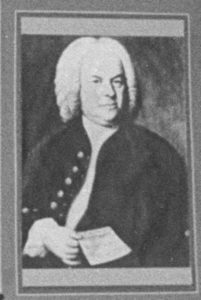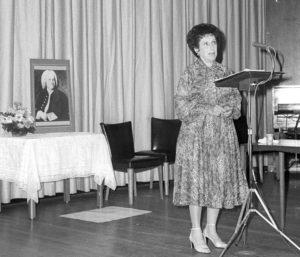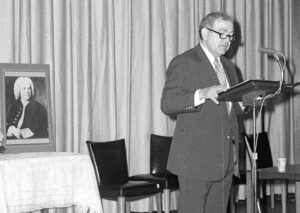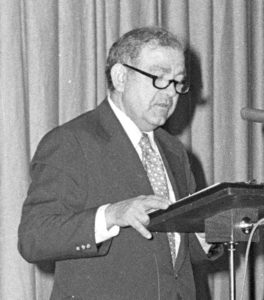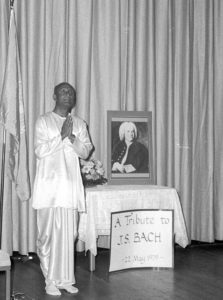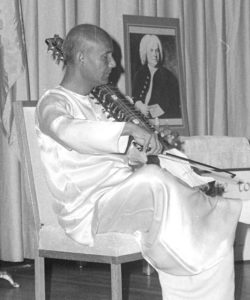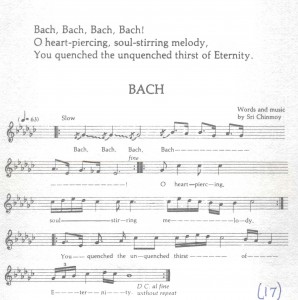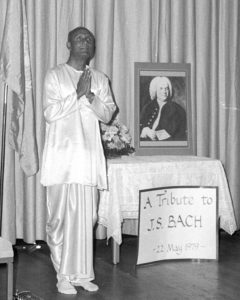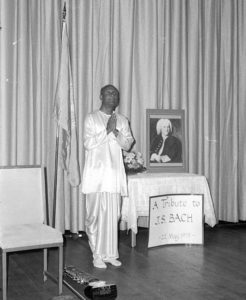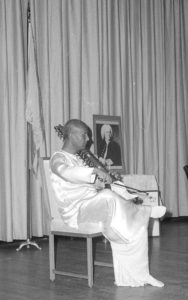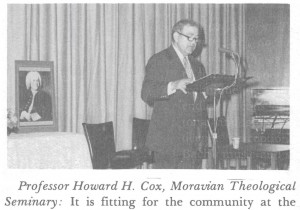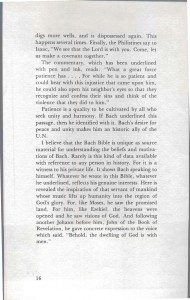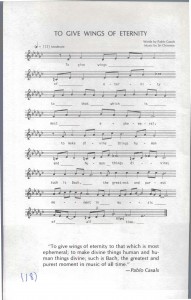Tribute to Johann Sebastian Bach, 1979 May 22
Filed under Music and Songs | Other Awards, Citations, PresentationsOn 22 May 1979 the Peace Meditation group at the UN had the honour to present a programme in tribute to the composer Johann Sebastian Bach, with guest speakers Miss Rosalyn Tureck and Professor Howard H. Cox.
Miss Tureck, the internationally renowned pianist and “First Lady of Bach,” is the foremost exponent of Bach’s keyboard music in the world today. Miss Tureck is the Founder and Director of the International Bach Society. Her work in Bach as performer and recording artist on all keyboard instruments, as conductor and as lecturer distinguishes her as a multifaceted Bach specialist of un- paralleled stature.
Professor Cox of the Moravian Theological Seminary is presently researching Bach’s personal Bible, just discovered a few years ago, in which Bach had entered his own handwritten marginal comments. This is considered a major discovery since £t provides a new insight into the composer’s thought and beliefs.
Sri Chinmoy played solo on esraj, and several members of the group performed some of Bach’s chamber music. The meditation group choir sang compositions dedicated to Bach by Sri Chinmoy, which are reprinted in this issue.
Highlights of the programme follow.
Miss Rosalyn Tureck, Director of the International Bach Society:
(Speaking of a “revelation” she had at the age of 16). I had to form a new way of thinking about music, including a new keyboard technique of p rasing, dynamics, touch and endless means of performance . . . a totally new tonal and physical piano technique to match the deeper perception which came to me of what Bach’s music and structure really is.
(Summing up her philosophy while talking about the Goldberg Variations) On the piano I perform the ‘Goldberg’ Variations as they appear in the original and do not make any alterations in order to meet its technical demands on one keyboard. My piano performance does not imitate the harpsichord performance. However, the basic structure must stand undisturbed for its own sake on either instrument and it dictates the musical characteristics of each variation, as well.
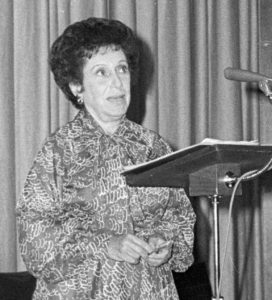 Thus in some variations I retain the same concept on both instruments but achieve it by different means . . . .
Thus in some variations I retain the same concept on both instruments but achieve it by different means . . . .
The ideal is to etch the structure in the music, to achieve the quality of the composer’s fantasy and vision, and always to employ the instrument as a means and never as an end in itself . . . . This performance is not intended for either/or choice. I have always believed in the principles of operation, rather than the attitudes of either/or.
One may indeed choose, but with music and instrument treated with respect and knowledgeable art, the integrity of the music should stand, retaining its clarity, its structure and its infinite significance to the human spirit.
Professor Howard H. Cox, Moravian Theological Seminary:
It is fitting for the community at the United Nations to give tribute to Bach. For not only does he provide in his music a message that envisions unity, fulfilment and wholeness for mankind consistent with the goal of the United Nations, but he was also aware of the realities: the brokenness of human relations and of human nature. One passage of underlined commentary in Bach’s Bible will illustrate this. It is commentary on the story of Isaac in Gen. 26. Isaac is being pushed around by the Philistines. He settles, digs wells, and then is dispossessed. So he settles again, digs more wells, and is dispossessed again . This happens several times. Finally, the Philistines say to Isaac , “We see that the Lord is with you. Come, let us make a covenant together .”
The commentary, which has been underlined with pen and ink, reads: “What a great force patience has . . . . For while he is so patient and could bear with this injustice that came upon him, he could also open his neighbor’s eyes so that they recognize and confess their sins and think of the violence that they did to him .”
Patience is a quality to be cultivated by all who seek unity and harmony. If Bach underlined this passage, then he identified with it.
Bach’s desire for peace and unity makes him an historic ally of the U.N. I believe that the Bach Bible is unique as source material for understanding the beliefs and motivations of Bach. Rarely is this kind of data available with reference to any person in history. For it is a witness to his private life. It shows Bach speaking to himself. Whatever he wrote in this Bible, whatever he underlined, reflects his genuine interests.
Here is revealed the inspiration of that servant of mankind whose music lifts up humanity into the region of God’s glory. For, like Moses, he saw the promised land. For him, like Ezekiel, the heavens were opened and he saw visions of God. And following another Johann before him, John of the Book of Revelation, he gave concrete expression to the voice which said, “Behold, the dwelling of God is with men.”
Sri Chinmoy lead a meditation
and played on the Indian Esraj
Members of the meditation group perform some of Bach’s works.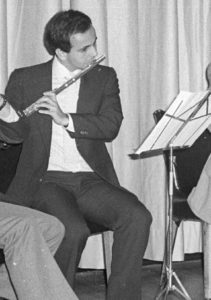
Songs
(Music scores related to below are in Gallery 2)
BACH – Words and music by Sri Chinmoy
Bach, Bach, Bach, Bach!
O heart-piercing, soul-stirring melody,
You quenched the un quenched thirst of Eternity.
TO GIVE WINGS OF ETERNITY – Words by Pablo Casals Music by Sri Chinmoy
To give wings of eternity to that which is most ephemeral ;
to make divine things human and human things divine;
such is Bach, the greatest and purest moment in music of all time .” -Pablo Casals
BACH IS THE END – Words by Albert Schweitzer Music by Sri Chinmoy
“Bach is the end. Nothing comes from him;
everything merely leads up to him.” -Albert Schweitzer
BACH IS THE FATHER – Words by W. A. Mozart Music by Sri Chinmoy
“Bach is the father, we are the children.” -W. A. Mozart
ONLY PRACTISE IT DILIGENTLY – Words by J.S. Bach Music by Sri Chinmoy
“Only practise it diligently, it will go very well.
You have five just as healthy fingers on each hand as I.” J.S. Bach
I OFFER MYSELF – Words by 1.5. Bach, Music by Sri Chinmoy.
“I offer myself in most dutiful obedience .” -J.S. Bach
See also report in periodical Bulletin “Meditation at the UN” Jul 1980, in PDF format:
bu-scpmaun-1980-07-27-vol-08-n-07-jul-ocr-opt.pdf
Note related scanned page-images 21- to 28
(also in Gallery 2 as jpg format)
Gallery 1 – Photos from event
- Shraddha
- Shraddha
- Shraddha
- Shraddha
- Shraddha
- Shraddha
- Shraddha
- Shraddha
- Shraddha
- Shraddha
- Shraddha
- Shraddha
- Shraddha
